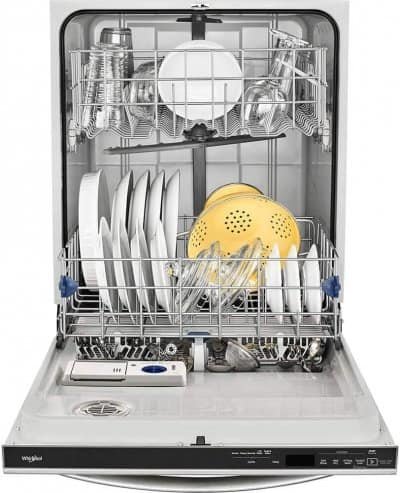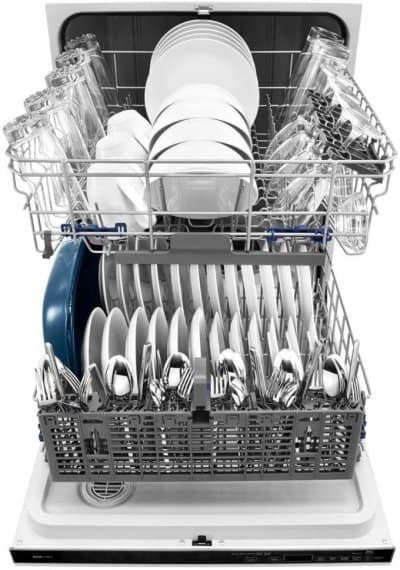The convenience of a dishwasher in our modern lives cannot be overstated. It saves time and effort, but have you ever wondered how much electricity a dishwasher consumes? In this article, we’ll explore the energy usage of dishwashers, factors affecting their consumption, and tips to reduce energy usage.
Table of Contents
How Does a Dishwasher Work?
Before we delve into electricity consumption, it’s essential to understand how dishwashers work. Dishwashers use a combination of hot water, detergent, and mechanical cleaning to efficiently clean and rinse dishes. They typically have several cycles, including pre-wash, main wash, and rinse cycles, all aided by sprayers, pumps, and heating elements.
Factors Affecting Energy Usage
Several factors influence the electricity consumption of a dishwasher. The size of the dishwasher, the energy efficiency of the model, the water temperature, the duration of the cycle, and the load capacity all play a role. Additionally, the frequency of use and the energy settings selected can impact electricity consumption.
Energy Efficiency Ratings
When shopping for a dishwasher, it’s important to consider energy efficiency ratings. Look for dishwashers with ENERGY STAR labels, as these appliances meet strict energy efficiency guidelines set by the Environmental Protection Agency. Energy-efficient models typically use less electricity and water, resulting in cost savings and reduced environmental impact.
Understanding Dishwasher Wattage
Dishwasher wattage refers to the amount of power the appliance consumes while in operation. Most dishwashers have wattages ranging from 1,200 to 2,400 watts. Higher wattages are generally associated with larger models and more powerful cleaning capabilities. However, the wattage alone does not provide a complete picture of energy usage. The duration of the cycle and energy-saving features also affect overall electricity consumption.
Average Electricity Consumption
On average, a dishwasher uses around 1,200 to 2,400 watts per cycle. The duration of a typical dishwasher cycle varies between 1.5 to 4 hours, depending on the dishwasher model and selected settings. It’s important to note that dishwashers with energy-saving features or shorter cycles will consume less electricity compared to older or less efficient models.

Tips to Reduce Energy Usage
To reduce the electricity consumption of your dishwasher, consider the following tips:
- Load the dishwasher efficiently to maximize space and minimize the need for additional cycles.
- Scrape off excess food instead of pre-rinsing dishes, as most modern dishwashers are designed to handle food residues.
- Choose the energy-saving mode or shorter cycles when appropriate.
- Use the dishwasher during off-peak electricity hours to take advantage of lower rates.
- Regularly clean and maintain your dishwasher to ensure optimal performance and efficiency.

Benefits of Energy-Efficient Models
Investing in an energy-efficient dishwasher offers various benefits. These models not only save electricity but also reduce water consumption, leading to cost savings on utility bills. Additionally, energy-efficient dishwashers often have advanced features and superior cleaning capabilities, ensuring sparkling clean dishes while minimizing environmental impact.
Environmental Impact of Dishwashers
Although dishwashers consume electricity, their environmental impact can be lower compared to handwashing. Efficiently loaded dishwashers use less water and energy than manual washing, especially when hot water is involved. By selecting energy-efficient models and following best practices, you can contribute to conserving resources and reducing carbon emissions.
Comparing Dishwashers and Handwashing
When deciding between using a dishwasher or handwashing, it’s important to consider various factors. Handwashing dishes multiple times a day can consume more water and energy compared to a dishwasher. However, for small loads or delicate items, handwashing may be a more practical option. Ultimately, finding the right balance and considering the specific circumstances is key.
Do dishwashers use a lot of electricity?
Dishwashers use electricity to power the motor that pumps water and moves the spray arms. The amount of electricity used depends on the size and efficiency of the dishwasher.
On average, a standard-sized dishwasher uses about 2.5 kWh per cycle, which is more than washing dishes by hand but much less than running multiple loads in an inefficient dishwasher.
Most modern dishwashers are designed to be energy efficient, using less water and energy per cycle than older models. Some models have settings that allow you to reduce the amount of electricity used even further, such as a half-load or energy-saving cycle.
Additionally, many utilities offer incentives for purchasing Energy Star certified appliances such as dishwashers that meet certain standards for energy efficiency.
Overall, while dishwashers use more electricity than washing dishes by hand, they are still a relatively efficient way to clean dishes compared to other appliances and can help save time and money in the long run.
Are dishwashers more energy-efficient than handwashing?
Dishwashers are generally more energy-efficient than handwashing, especially when used efficiently and with energy-saving features. They typically use less water and energy, contributing to cost savings and reduced environmental impact.
How can I determine the energy efficiency of a dishwasher?
Look for dishwashers with ENERGY STAR labels, which indicate that they meet specific energy efficiency guidelines. Additionally, check the dishwasher’s energy consumption specifications and compare them with other models to make an informed choice.
How can I reduce the energy consumption of my dishwasher?
To reduce energy consumption, load your dishwasher efficiently, scrape off excess food instead of pre-rinsing, choose energy-saving modes or shorter cycles, and maintain your dishwasher regularly for optimal performance.
How long does a typical dishwasher cycle last?
The duration of a dishwasher cycle varies depending on the model and selected settings, ranging from 1.5 to 4 hours. Energy-saving modes or shorter cycles can help reduce the overall duration.
Is it better to use a dishwasher during off-peak electricity hours?
Using your dishwasher during off-peak electricity hours can be beneficial, as some utility providers offer lower rates during those times. It can result in cost savings on your electricity bill.
Is it bad to run a dishwasher half empty?
Running a dishwasher half empty is not ideal, but it can be done. It’s important to remember that a dishwasher needs enough dishes to create the right amount of pressure for the water to circulate and clean the dishes properly. If you don’t have enough items in the dishwasher, there won’t be enough water pressure for effective cleaning.
Also, when running a dishwasher half empty, it’s important to make sure that all items are placed securely in the racks so they don’t move around during the wash cycle. Otherwise, dishes may come out dirty or damaged. Lastly, if you’re running a half-empty dishwasher, you should adjust the settings accordingly, for example, use a shorter cycle or lower temperature setting. This will help conserve energy and ensure your dishes get clean without wasting too much water or energy.
What is the best time to run dishwasher?
The best time to run a dishwasher is typically in the evening, after dinner. This allows you to clean up your dishes and get them out of the way so they won’t be sitting around all night. It also helps conserve energy since most people’s electricity rates are lower at night. Additionally, running the dishwasher at night can reduce noise pollution since it can be quite loud during the day when everyone is home and awake.
Conclusion
Dishwashers have become an indispensable appliance in modern households, providing convenience and efficiency. Understanding the electricity consumption of dishwashers is essential for making informed decisions about energy usage. By following energy-saving practices, investing in energy-efficient models, and using dishwashers efficiently, you can enjoy the benefits while minimizing environmental impact.

